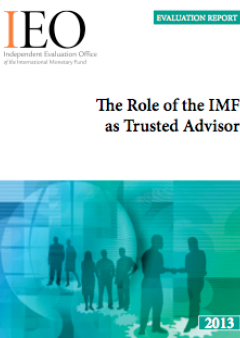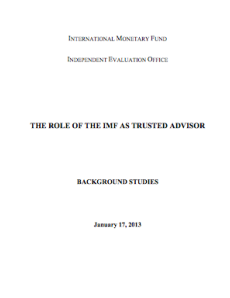
The Role of the IMF as Trusted Advisor
Providing policy advice to its member countries is an integral part of carrying out the Fund's mandate to foster macroeconomic stability and thereby facilitate prosperity. Ultimately, the means to achieve these goals is to have Fund policy advice translated into concrete action. Key to achieving such traction is the receptivity of countries to advice, which depends not only on their confidence in the quality and relevance of the advice, but also on the relationship established between Fund staff and member country authorities. The evaluation explores these issues on the basis of evidence gathered since 2005, but emphasizes the period since the onset of the global crisis in 2007–08.
The evaluation found that the degree to which the Fund is viewed as a trusted advisor tends to differ by region and country type. But in the aftermath of the global crisis, the Fund's image appears to have improved markedly, and the Fund is now viewed as more flexible and responsive than in the past. The evaluation explores how the IMF can sustain this more positive image when the crisis abates, while recognizing that tensions will always exist between the Fund's roles as a watchdog on behalf of the global economy and as trusted advisor to individual countries.
The evaluation's recommendations aim to address some longstanding problems that undermine trust in the Fund and other key challenges identified by this evaluation. Among these:
- Enhance the value-added of Article IV consultations for country authorities;
- Strengthen the continuity of the relationship between the Fund and member countries;
- Incorporate early and openly the views of all countries during the preparation of major policy papers;
- Reduce unnecessary disclosure concerns;
- Work closely with country authorities to design a customized outreach strategy; and
- Implement the Fund's transparency policy in a uniform and fair manner.
The evaluation concludes that the IMF's recent reform efforts and initiatives provide an opportunity for the institution to address some of the findings it identifies. But to ensure that these reforms truly take root in the culture of the institution will require close monitoring and accountability by all IMF stakeholders over an extended period.
‚ÄãSee also:

